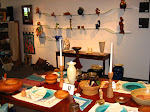Fair World Marketplace is unpacking orders of new products from around the world, including new instruments from Peru, via Inter-American Trading


Fair World Marketplace was a fair trade store
(a Ten Thousand Villages partner store) located in Syracuse/DeWitt, New York. Over seven years, sales from this store provided more than $250,000 in income for artisan and farmer co-ops throughout the world. Declining sales following the 2008 recession forced the store's closure in 2011.
(a Ten Thousand Villages partner store) located in Syracuse/DeWitt, New York. Over seven years, sales from this store provided more than $250,000 in income for artisan and farmer co-ops throughout the world. Declining sales following the 2008 recession forced the store's closure in 2011.
Thank you for your support for fair trade!
Friday, July 25, 2008
New Instruments
Thursday, July 17, 2008
Wednesday, July 2, 2008
Fair Trade and Big Retail
Business Week chronicles the debate over the increased marketing of fair-trade products by mass-market chains such as WalMart and Sam's Club:
... When Sam's started offering fair-trade tea, bananas, and roses earlier this year, it seemed like a huge win for the movement, which had already seen sales of fair-trade coffee grow tenfold from 2001 to 2006, to $730 million. "The idea of bringing high-quality items to our members at a great value that were produced in an environmentally and socially responsible way was just too compelling to pass up," says Gregg Spragg, executive vice-president for merchandising at Sam's Club, who replied to questions via e-mail.
But all the fair-trade cut flowers and a large quantity of tea, bananas, and sugar imported to the U.S. come from big plantations in places such as Ecuador and Colombia. "The large companies want to continue working with mass producers like plantations rather than going the tougher route, which is identifying small farmers and buying from them," says Carmen K. Iezzi, executive director of the Fair Trade Federation, a trade group of companies that say they are 100% committed to fair trade.
... Iezzi and others aim much of their criticism at TransFair USA, which is expanding fair-trade certification at a frenetic pace. They say that to keep up the pace of expansion, the organization is taking shortcuts that compromise the original concept. "When large, conventional plantations get fair-trade certified for improving practices, we consider that 'fair-trade lite,' " says Rink Dickinson, president and co-founder of Equal Exchange, a West Bridgewater (Mass.) company that is committed to buying only from farmer-run cooperatives. "There may be reforms, but it is a kindler, gentler version of the same old thing and falls short of what some of us are advocating." Rice, who started TransFair in 1999, disagrees. "The notion that the standards have been lowered is ill-informed," he says. "Our objective is to help the poor, whether they own a plot of land or not."
Part of the problem Rice and Wal-Mart face is the difficulty of applying the same standards of equity and economics to different types of crops. While half of the global production of coffee comes from small farms, it takes a larger operation to compete in bananas, tea, cut flowers, or sugar. "The disadvantaged majority would be locked out of the market if I were to look for only small farms for bananas and tea," says Rice.
Subscribe to:
Posts (Atom)




